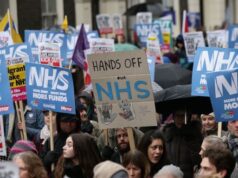Issue: 33
February 2016
This occasional newsletter is researched, written and edited by a group of concerned residents in Ealing, West London who want to preserve our NHS. We view the wholesale engagement of private, for-profit healthcare service suppliers as unnecessary, profligate and dangerous. Process improvement is what is needed in our NHS – not revolution.
NHS NW London’s ‘Shaping a Healthier Future’ (SaHF) Payments to Management Consultants Since 2019/10 Now Exceed £71 Million
Colin Standfield of ‘Save Our Hospitals’ has assiduously submitted Freedom of Information requests in order to track NHS NW London’s SaHF payments to management consultants. Since 2009/10 to date the payments total £71, 640, 908.65. Almost half of this cash was paid to McKinsey and Company.
One might reasonably ask what measurable benefits have accrued from this massive outpouring of public funds? There has been no discernible improvements in A& E performance. We can all make our own minds up as to whether the closure of two hospital A&E units and the closure of a hospital maternity unit actually count as benefits.
Hammersmith & Fulham Council Write to Government to Immediately Halt the ‘Shaping a Healthier Future’ Plan as Its Costs are Out of Control
Hammersmith & Fulham Council Leader Councillor Stephen Cowan has written to Health Secretary Jeremy Hunt MP requesting a meeting to discuss ‘Shaping a Healthier Future’ (SaHF). SaHF was severely criticised by the 2015 Independent Healthcare Commission (IHC) report. The IHC highlighted that the 2012 cost estimate for SaHF of £112 million had ballooned in 2015 to £1.3 billion. SaHF prescribes that the majority of services at Charing Cross and Ealing Hospitals will be axed. Apparently Brent, Ealing, Harrow and Hounslow Councils have all joined with Hammersmith & Fulham in this initiative.
Private Healthcare News
Care UK
Care UK will soon no longer run Ealing Hospital’s Urgent Care Centre (UCC). Its current contract will not be renewed. Care UK announced publicly in 2015 that it had never made a profit out of running the UCC.
Circle Holdings
Its share price has dropped by 60% in the period 1 January 2016 to 26 January 2016. Incredibly the company says it has no idea why this disastrous share price drop has occurred.
BUPA
BUPA is trying to sell off its home care services. In 2013 BUPA wrote off £32.8 million of its value due to low public sector fees. In the half year to October 2015 BUPA lost £5.7 million on sales of £62.5 million.
IS THE GOVERNMENT TRYING TO DESTROY THE NHS NURSING SERVICE IN ENGLAND?
‘Bursaries Not Bombs’
This was the most powerful and succinct message on placards paraded in Westminster on Saturday 9 January 2016. I was one of thousands who marched in the wind and rain to support trainee nurses retaining Bursary payments. We marched along a circuitous route from St Thomas’ Hospital to Downing Street. Nurses, trainee nurses, junior doctors, consultants, midwives, trainee midwives and activist groups were all in evidence in the noisy demonstration.
Unlike other undergraduates, trainee nurses work many unpaid hours – nursing patients. Annual Bursaries (from £1,000 to £5,460) don’t offer real salaries but provide trainee nurses with a subsistence allowance. Currently nurses do not have to pay tuition fees.
The Government’s proposals are that nurses pay their own tuition fees which could be up to £9,000 per year and pay for their living costs.
Figures recently released by the Royal College of Nursing reveal a huge shortage of nurses. We have 10,000 nurse vacancies in London. The biggest vacancies are in the London North West Healthcare Trust (includes Ealing Hospital) where there were 811 vacancies in July 2015. This is 30% of the Trust’s nursing strength. West London Mental Health Trust (which services Ealing) had 242 nursing vacancies in July 2015 – which is 22% of its nursing work force.
The Government’s great idea is that Bursaries should be discontinued and English trainee nurses should take out loans. This way they would be truly nursing patients for nothing whist undergoing training. When qualified with an Associate degree after two years nurses will be in debt to the tune of £18,000 for tuition fees alone. Taking the more common educational path of a four year Batchelor’s degree in nursing the tuition debt will be £36,000. Given we have this massive shortage of nurses, how would these new arrangements encourage or incentivise anyone to enter nurse training? They wouldn’t and this is bonkers.
Blocking Overseas Nurses
Between April and November 2015, 2,341 requests by NHS hospitals to employ overseas nurse were turned down by the Government.
General Practice Nursing
Research just published by the Queens Nursing Institute has revealed that 33.4% of General Practice Nurses (GPNs) will retire by 2020. 43.1% did not feel their nursing team had the right number of appropriately qualified and trained staff. 23.1% had second jobs as well being GPNs.
IS THE GOVERNMENT TRYING TO DRIVE DOCTORS OUT OF THE NHS?
At 8:30am on Tuesday 12 January 2016 I stood on the Junior Doctors/BMA picket line outside Ealing Hospital. These brave young doctors seemed both nervous and confident about going on strike. Health bosses have tried to both frighten and patronise these people who work hard to soothe our pain and keep us alive. Claims like ‘they won’t help citizens if there is a terrorist attack’ and ‘they don’t understand what is on offer’ only serve to make them more determined.
On 13 January 2016, Secretary of State Hunt was caught on TV saying that the Government will force through the new doctors’ contract. He also parroted the familiar mantra of seven day working. On 18 January Prime Minister Cameron re-iterated that Junior Doctors could be forced unilaterally to accept these new contracts. It doesn’t take a genius to realise that if you are going to offer 24 hour full services every day the NHS will need more staff at all levels, more money to pay them and more beds. One wonders whether the Government has misjudged the mood of the country here. This isn’t like the miners’ strike. There’s clearly national support and sympathy for the junior doctors – I really do not think that was the case with the miners.
On 19 January the BMA suspended the 48 hour strike planned to start on 26 January. On 20 January a report suggested that Saturday working and safety were still major sticking points in the negotiations between the BMA, NHS Employers and the Department of Health (DoH). Those negotiations took place on 21 and 22 January at ACAS, but no agreement was reached. On 21 January Junior Doctors and medical professors accused the DoH of ‘misusing statistics’ on weekend deaths. Apparently the DoH, Hunt and Cameron are quoting out of date data. The latter say that stroke patients are 20% more likely to die at weekends. The doctors and professors say that because of recent NHS improvements this is no longer the case. The Junior Doctors say that scaremongering by politicians is persuading patients to avoid being admitted to hospital at the weekend.
IS THE GOVERNMENT FORCING GPS TO QUIT?
Commonwealth Fund research has revealed that 29% of UK GPs plan to quit within five years. 20% of GPs became ill in 2015. 59% said they found their work stressful.
‘Pulse’ magazine has revealed that 31 GP practices closed and 41 branch surgeries closed in 2015. 200,000 patients were left without a GP as a result of these closures. This is a significant rise as closures in 2013 left 43,000 patients GP-less. Anecdotally there are many reasons why GP surgeries in England are closing. Here are some examples:
Running at a loss – Trentside Medical Group will not renew its contract to run Colwick Vale surgery in Nottingham because it can’t run the surgery at a profit.
CQC cancels registration – Oulton Medical Centre and Marine Parade surgery in East Anglia in October 2015. CQC claimed patients were at risk.
Building not fit for purpose – Wordsley Green Medical Practice’s surgery in Kingswinford in Dudley is to close because the local CCG says that the surgery building is not fit for purpose.
GP retiring – the only doctor at Wyken Medical Centre in Coventry is retiring so the surgery will close.
GP sickness – Bingfield Street surgery in Islington closed in 2015 as one of its doctors, who had been off sick for many months, did not return to work.
NHS dictat – In November 2015 NHS England announced the closure of Okement surgery in Okehampton, Devon. There was no public or patient consultation.
To Whom are GPs Accountable?
It’s all a bit confusing.
NHS England ‘commissions’ GPs. CQC can close down GP surgeries. GPs have to justify every hospital referral to their CCG. Some CCGs pay (bribe?) some GPs to do various things. In Ealing some GPs are paid by ECCG to provide mental health primary care. In Hammersmith & Fulham GPs apparently are rewarded by their CCG for not referring patients to hospitals.
Grandiosely Secretary of State Hunt says that GPs are accountable to their patients.
GPs met at a BMA Special Local Medical Committee (LMC) conference in London on 30 January 2016. The event was specifically convened to decide what actions are needed to ensure GPs can deliver a safe and sustainable service. It was decided that the General Practitioners Committee (GPC) should canvass GPs as to their willingness to submit undated resignations, unless negotiation with government for a rescue package for General Practice are concluded successfully within six months. GPs expressed their anger about CQC. They voted overwhelmingly ‘to explore all options by which GP practices could lawfully withdraw from engaging with CQC’.
THE GOVERNMENT IS PUTTING PHARMACIES OUT OF BUSINESS
As of October 2016 up to a quarter of pharmacies in England will have been forced out of business by the Government. Annual fees paid to high street pharmacies will be cut by £170 million. Apparently the reason for this is a spatial planning one. The Government reckons there are too many pharmacies on our high streets.
‘Redundant NHS Staff Rehired in £92 Million Farce’
This was the front page headline in the 11 January 2016 issue of ‘The Times’. According to data revealed in replies to Labour Party Parliamentary questions, 2,641 NHS staff were laid off and rehired in the three years from April 2012. The average redundancy payment was £36,000 although some senior staff received over £300,000. Probably the star performer in this remuneration scandal was Karen Straughair who was paid £605,000 when NHS South of Tyne and Wear was wound up in June 2014. She then got a job as Recovery Director at Leeds Teaching Hospital NHS Trust.
The tragedy of all this is that this massive financial ‘leakage’ was and is legal. Why can’t legislation be enacted which demands that if you are made redundant by company x and then rehired by company x you have to pay back the redundancy cash?
In September 2013 we reported in our newsletter that the NHS had spent £1.4 billion on redundancy payments since 2010.




